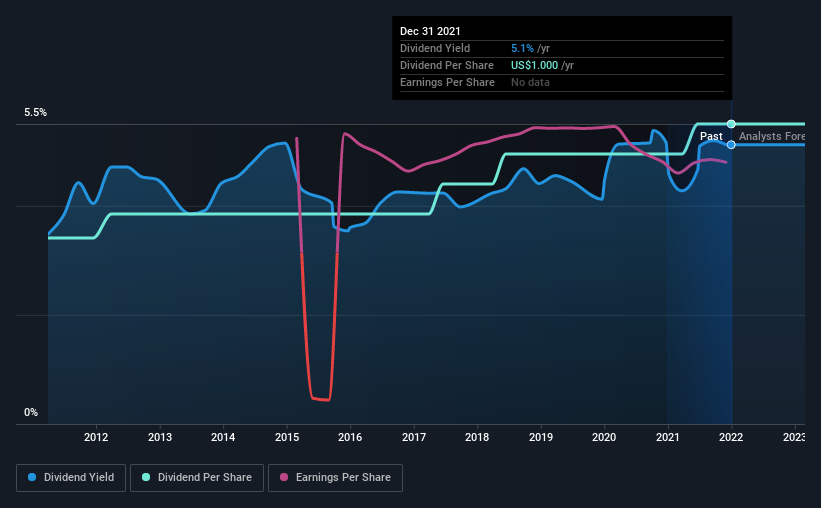It Might Not Be A Great Idea To Buy Ennis, Inc. (NYSE:EBF) For Its Next Dividend
Readers hoping to buy Ennis, Inc. (NYSE:EBF) for its dividend will need to make their move shortly, as the stock is about to trade ex-dividend. The ex-dividend date is one business day before a company's record date, which is the date on which the company determines which shareholders are entitled to receive a dividend. The ex-dividend date is an important date to be aware of as any purchase of the stock made on or after this date might mean a late settlement that doesn't show on the record date. This means that investors who purchase Ennis' shares on or after the 5th of January will not receive the dividend, which will be paid on the 3rd of February.
The company's upcoming dividend is US$0.25 a share, following on from the last 12 months, when the company distributed a total of US$1.00 per share to shareholders. Last year's total dividend payments show that Ennis has a trailing yield of 5.1% on the current share price of $19.53. We love seeing companies pay a dividend, but it's also important to be sure that laying the golden eggs isn't going to kill our golden goose! So we need to check whether the dividend payments are covered, and if earnings are growing.
View our latest analysis for Ennis
If a company pays out more in dividends than it earned, then the dividend might become unsustainable - hardly an ideal situation. Last year Ennis paid out 90% of its profits as dividends to shareholders, suggesting the dividend is not well covered by earnings. Yet cash flow is typically more important than profit for assessing dividend sustainability, so we should always check if the company generated enough cash to afford its dividend. Over the last year it paid out 55% of its free cash flow as dividends, within the usual range for most companies.
It's good to see that while Ennis's dividends were not well covered by profits, at least they are affordable from a cash perspective. Still, if this were to happen repeatedly, we'd be concerned about whether the dividend is sustainable in a downturn.
Click here to see how much of its profit Ennis paid out over the last 12 months.
Have Earnings And Dividends Been Growing?
Businesses with shrinking earnings are tricky from a dividend perspective. If business enters a downturn and the dividend is cut, the company could see its value fall precipitously. So we're not too excited that Ennis's earnings are down 3.5% a year over the past five years.
The main way most investors will assess a company's dividend prospects is by checking the historical rate of dividend growth. In the last 10 years, Ennis has lifted its dividend by approximately 4.9% a year on average. The only way to pay higher dividends when earnings are shrinking is either to pay out a larger percentage of profits, spend cash from the balance sheet, or borrow the money. Ennis is already paying out a high percentage of its income, so without earnings growth, we're doubtful of whether this dividend will grow much in the future.
The Bottom Line
Is Ennis worth buying for its dividend? Earnings per share have been in decline, which is not encouraging. Additionally, Ennis is paying out quite a high percentage of its earnings, and more than half its cash flow, so it's hard to evaluate whether the company is reinvesting enough in its business to improve its situation. It's not that we think Ennis is a bad company, but these characteristics don't generally lead to outstanding dividend performance.
Although, if you're still interested in Ennis and want to know more, you'll find it very useful to know what risks this stock faces. Every company has risks, and we've spotted 2 warning signs for Ennis (of which 1 doesn't sit too well with us!) you should know about.
We wouldn't recommend just buying the first dividend stock you see, though. Here's a list of interesting dividend stocks with a greater than 2% yield and an upcoming dividend.
Have feedback on this article? Concerned about the content? Get in touch with us directly. Alternatively, email editorial-team (at) simplywallst.com.
This article by Simply Wall St is general in nature. We provide commentary based on historical data and analyst forecasts only using an unbiased methodology and our articles are not intended to be financial advice. It does not constitute a recommendation to buy or sell any stock, and does not take account of your objectives, or your financial situation. We aim to bring you long-term focused analysis driven by fundamental data. Note that our analysis may not factor in the latest price-sensitive company announcements or qualitative material. Simply Wall St has no position in any stocks mentioned.

